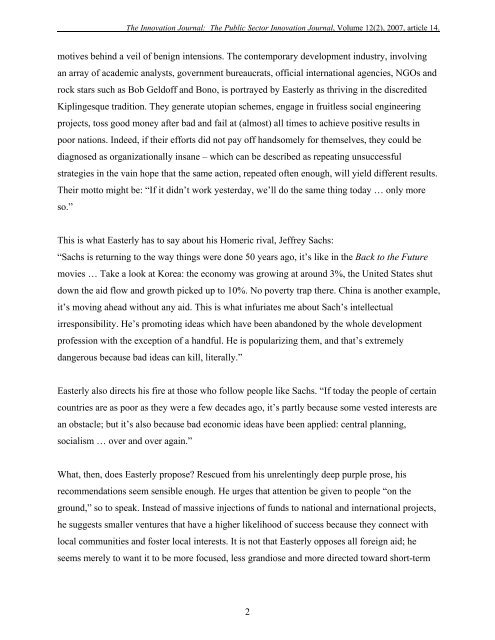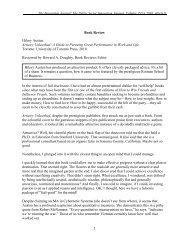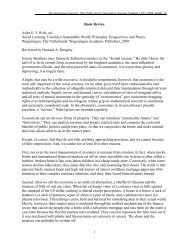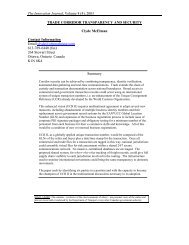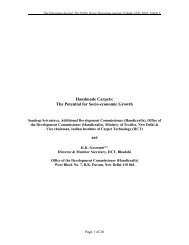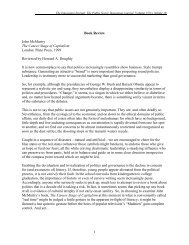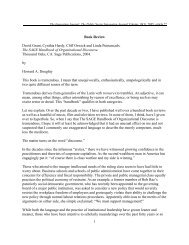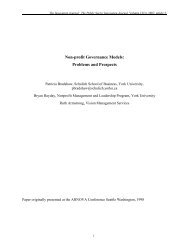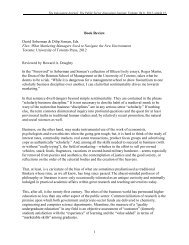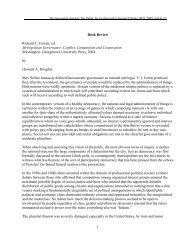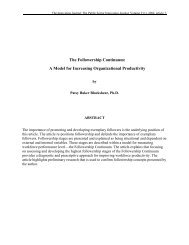William Easterley, White Man's Burden - The Innovation Journal
William Easterley, White Man's Burden - The Innovation Journal
William Easterley, White Man's Burden - The Innovation Journal
You also want an ePaper? Increase the reach of your titles
YUMPU automatically turns print PDFs into web optimized ePapers that Google loves.
<strong>The</strong> <strong>Innovation</strong> <strong>Journal</strong>: <strong>The</strong> Public Sector <strong>Innovation</strong> <strong>Journal</strong>, Volume 12(2), 2007, article 14.<br />
motives behind a veil of benign intensions. <strong>The</strong> contemporary development industry, involving<br />
an array of academic analysts, government bureaucrats, official international agencies, NGOs and<br />
rock stars such as Bob Geldoff and Bono, is portrayed by Easterly as thriving in the discredited<br />
Kiplingesque tradition. <strong>The</strong>y generate utopian schemes, engage in fruitless social engineering<br />
projects, toss good money after bad and fail at (almost) all times to achieve positive results in<br />
poor nations. Indeed, if their efforts did not pay off handsomely for themselves, they could be<br />
diagnosed as organizationally insane – which can be described as repeating unsuccessful<br />
strategies in the vain hope that the same action, repeated often enough, will yield different results.<br />
<strong>The</strong>ir motto might be: “If it didn’t work yesterday, we’ll do the same thing today … only more<br />
so.”<br />
This is what Easterly has to say about his Homeric rival, Jeffrey Sachs:<br />
“Sachs is returning to the way things were done 50 years ago, it’s like in the Back to the Future<br />
movies … Take a look at Korea: the economy was growing at around 3%, the United States shut<br />
down the aid flow and growth picked up to 10%. No poverty trap there. China is another example,<br />
it’s moving ahead without any aid. This is what infuriates me about Sach’s intellectual<br />
irresponsibility. He’s promoting ideas which have been abandoned by the whole development<br />
profession with the exception of a handful. He is popularizing them, and that’s extremely<br />
dangerous because bad ideas can kill, literally.”<br />
Easterly also directs his fire at those who follow people like Sachs. “If today the people of certain<br />
countries are as poor as they were a few decades ago, it’s partly because some vested interests are<br />
an obstacle; but it’s also because bad economic ideas have been applied: central planning,<br />
socialism … over and over again.”<br />
What, then, does Easterly propose? Rescued from his unrelentingly deep purple prose, his<br />
recommendations seem sensible enough. He urges that attention be given to people “on the<br />
ground,” so to speak. Instead of massive injections of funds to national and international projects,<br />
he suggests smaller ventures that have a higher likelihood of success because they connect with<br />
local communities and foster local interests. It is not that Easterly opposes all foreign aid; he<br />
seems merely to want it to be more focused, less grandiose and more directed toward short-term<br />
2


